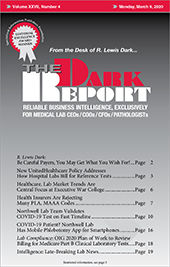>CEO SUMMARY: Under a new policy UnitedHealthcare will start in May, hospital laboratories will no longer be allowed to bill for reference testing for members who are not hospital patients. The policy is likely to affect clinical lab testing for patients whose testing goes through a hospital’s outreach program. UnitedHealthcare would prefer that all outreach …
New UnitedHealthcare Policy For Hospital Reference Tests Read More »
To access this post, you must purchase The Dark Report.


